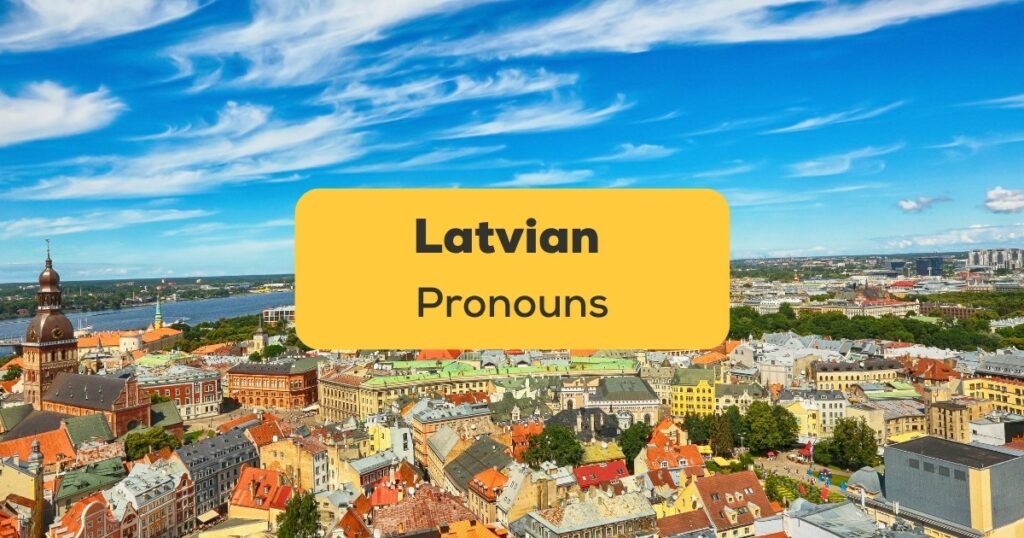Generally speaking, Like English, Latvian pronouns can be used instead of nouns. For example, you can use the pronoun “she” instead of saying that “Julie speaks four languages” and that “she speaks four languages.” Learning the Latvian pronouns shown below is essential for the language. Latvian pronouns include:
- Personal pronouns (referring to the person speaking, or the things or persons spoken about, the persons spoken to. For e.g., you, I, she, he, it, they, we, me, her, him, them, and us).
- Relative pronoun. (a pronoun that heads an adjective clause. E.g., whom, which, whose, who, that)
- Indefinite pronouns (do not have a specific familiar referent. For e.g., everybody everyone, everything, many, few, somebody)
- Reflexive or reciprocal pronouns (in which the verb’s subject is acting on the verb’s object. E.g., “Mary and John love themselves” or “Mary and John love each other”).
Latvian Pronouns In Sentences

Here is a list of the Personal, indefinite, relative, reflexive, or reciprocal pronouns in Latvian sentences placed in a table. Learn and memorize this table so that it will help you add beneficial and essential words to your Latvian vocabulary.
| English Pronouns | Latvian Pronouns |
| I speak | Es runāju |
| you speak | Tu runā, jūs runājat |
| he speaks | viņš runā |
| she speaks | viņa runā |
| we speak | mēs runājam |
| they speak | viņi runā |
| give me | dod man/dodoet man |
| give you | dod tev/jums//dodiet tev /jums |
| give him | viņam |
| give her | dod , dodiet viņai |
| give us | dod/doties mums |
| give them | dod, dodiet viņiem /viņām |
| my book | mana grāmata |
| your book | tava/jūsu grāmata |
| his book | viņa grāmatu |
| her book | viņas grāmata |
| our book | mūsu grāmata |
| their book | viņu grāmatas |
| you speak very fast | jūs runājat ļoti ātri (tu runā ļoti ātri) |
| he has three dogs | viņam ir trīs suņi |
| can you tell me your name? | vai jūs varat man pateikt savu vārdu? |
| can she help us? | vai viņa varētu mums palīdzēt? |
| my name is Maya | mans vārds ir maya |
| their house is not far | viņu māja nav tālu |
| that restaurant is far | šis restorāns ir tālu |
| this is my house | šī ir mana māja |
The following is the most common list of object, subject, and possessive Latvian pronouns with their definitions and examples:
Latvian Pronouns With Examples

Here is the list of pronouns in Latvian. It includes possessive, subject, and object. These can be used daily, so it is better not to skip this lesson. We will start with the object pronoun such as ” you, I, she, he, and they”
Object Pronouns
Object pronouns are those pronouns that accept actions in a sentence.
| I | es |
| You (singular) | tu |
| He | viņš |
| She | viņa |
| We | mēs |
| You (plural) | jūs |
| They | viņi / viņas / tie / tās |
The followings are the examples of object pronouns in sentences
| I love you | es tevi mīlu |
| She is beautiful | viņa ir skaista |
| We are happy | mēs esam laimīgi |
| They are dancing | viņi dejo |
Subject Pronouns
Subject pronouns are pronouns that perform actions in sentences, such as “me, him, us, them”.
| Me | man / mani (accusative) |
| You | tev, jums / tevi / jūs |
| Him | viņam / viņu |
| Her | viņai / viņu / viņas (posessive) |
| Us | mums / mūs |
| You (plural) | jums / jūs |
| Them | viņiem / viņām / viņus / viņas / tām / tiem / tās / tos |
These are some examples to show how the subject pronoun can be used in a sentence.
| Give me your phone number | Iedod man, lūdzu, savu telefona numuru |
| I can give you my email | Es varu tev iedot savu e-pastu |
| Tell him to call me | Pasaki, lai viņš man piezvana |
| Can you call us? | Vai tu vari mums piezvanīt? |
Possessive Adjectives
Now, we have come to the possessive adjective part, which is used to refer to things we possess. For eg., “my, your, our, their …”.
| My | mans / mani / mana / manas |
| Your | tavs / tavas / tavi / jūsu / tava |
| His | viņa |
| Her | viņas |
| Our | mūsu |
| Your (pl.) | jūsu |
| Their | viņu / to |
These are examples of how to use possessive adjectives in sentences.
| My phone number is . . . | Mans telefona numurs ir… |
| His email is . . | Viņa e-pasts ir… |
| Our dream is to visit Spain | Mūsu sapnis ir aizbraukt uz Spāniju |
| Their country is beautiful | Viņu valsts ir skaista |
Possessive Pronouns
This is the possessive pronoun. It is used as an alternative to the possessive adjectives above. Instead of saying “It is my horse” we can say “It is mine”.
| Mine | manējā / manējais / manējie / manas / mans / mana / mani / manējās |
| Yours | tavējais / tavējie / tavējā / tavējās / tavs / tava / tavas / tavi / jūsējais / jūsējā / jūsu / jūsējās / jūsējie |
| His | viņa |
| Hers | viņas |
| Ours | mūsējais / mūsējās / musējie / mūsējā / mūsu |
| Yours (pl.) | jūsu |
| Theirs | viņu |
These are some examples of possessive pronouns in a sentence.
| The book is mine | Šī grāmata ir mana |
| Is this pen yours? | Vai šī pildspalva ir jūsu / tava? |
| The shoes are hers | Tās ir viņas kurpes |
| Victory is ours | Uzvara ir mūsu |
Learn The Latvian Language With Ling App
Learning a language takes time and resources to learn. So, as we all know, language learning apps like Ling, Write Me, and SimplyLearn are good ways to improve your learning experience. In addition, these language apps are designed to support you in learning different languages, regardless of your current level. So, if you are familiar with sentence structure in Latvian, why not learn Latvian essential words and phrases or Latvian love words and expressions?
Ling aims to make language learning as simple, fun, and easy to understand as possible. Using various mini-games and interactive learning techniques, you can engage yourself in the Latvian language by using your smartphone.
The Ling app can be accessed via the Play Store or a web-based platform so that you can learn anywhere and anytime. Hence, download and log in to these apps and start learning Latvian right away!





















